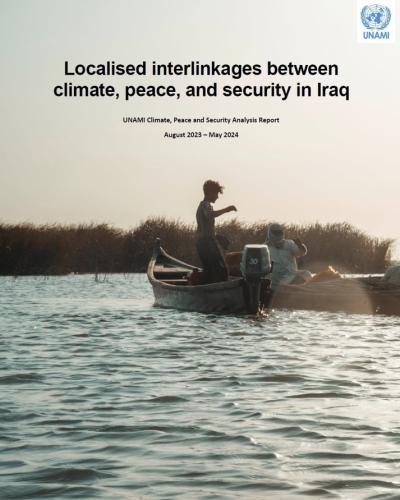Localised interlinkages between climate, peace, and security in Iraq UNAMI Climate, Peace and Security Analysis Report

Executive Summary
Iraq is among the world’s most climate vulnerable countries because of its geographic location and existing environmental fragility which interact with socio-economic and institutional factors. While Iraq is enjoying its most stable period since 2003, governance challenges, instability and violence still exist. Climate change has the potential to exacerbate these existing tensions to undermine peace and increase the risk of conflict. This report identifies four primary localised climate, peace and security risk pathways in Iraq. It further proposes entry points for climate, peace and security interventions and provides recommendations for addressing climate, peace, and security risks.
The primary localised climate, peace and security risk pathways in Iraq are: 1) direct competition for natural resources, 2) exploitation of natural resources by armed actors, 3) limited and politically motivated assistance for climate-displacement and 4) non-participatory, centralised natural resource management.
Direct competition for natural resources manifests itself as regular inter-community conflicts, primarily disputes about surface and ground water. Community conflicts in Iraq are often referred to as tribal conflicts. However, this oversimplifies the climate, peace and security relationships since the groups in conflict often have access to significant weapons and have affiliations with other armed groups and political parties. As a result, water conflicts can escalate quickly, leading to injuries and fatalities. Better natural resource management and governance, especially the reduction of water loss and pollution, is needed to reduce the risks of conflict. Integrated water resource management initiatives supported by the UN and the Government of Iraq should be clearly informed by climate, peace and security risk analysis to ensure positive peace and security impacts.
The exploitation of natural resources by armed actors is a significant and growing climate, peace and security risk in Iraq. It is reflective of the wider integration of armed groups in the social, political and economic systems of the country. Such groups now play an active, and sometimes dominant, role in the agriculture and land management sectors. These sectors have become revenue streams for armed groups, helping them to maintain and increase their membership and influence. As a result, efforts to protect and manage land and water, and take climate action have been undermined. To address this, environmental governance needs to be strengthened as part of Iraq’s progress towards bringing armed groups under the effective control of the state.
Like many countries, Iraq currently has no consistent system for identifying, registering, and providing services to people internally displaced by climate and environmental factors. A lack of an effective support system for climate displacement has caused feelings of marginalization and neglect by the displaced communities and the residents. This leads to frustration and a wide-ranging distrust of authorities and institutions, seriously eroding social cohesion and fuelling discontent. There is an urgent need for the Government and the UN System to better recognise and support people displaced by climate change.
Non-participatory, centralised natural resource management, especially with respect to water, has caused resentment against the Government authorities. At the local level, inconsistency and corruption have hindered effective natural resource governance. In some cases, regulations are enforced harshly and without community consultation, while in other cases there is no enforcement. This inequity has led to anger and civil unrest and ultimately has not protected water or land resources from mismanagement. There is an urgent need to establish transparent systems for public participation in natural resource management. To facilitate participation, public education and outreach about climate change is needed to ensure that communities understand the practical impacts of climate change. The UN can support the Government of Iraq to develop more inclusive, resource management and environmental-governance approaches at all levels. The roles and responsibilities of all stakeholders need to be clearly defined, from the national level to the governorate and community levels.
Fundamental improvements in governance, migration support and public awareness are needed to mitigate the existing climate, peace and security risks and prevent new risks from developing. The topic of climate change can act as a catalyst for public participation in environmental governance and peacebuilding. The UN and the Government of Iraq can support participatory climate forums which have been shown to generate opportunities for the government, civil society, private sector and academic stakeholders to collaborate.
Climate change presents a clear challenge as a risk-multiplier for conflict and insecurity in Iraq. Without intervention this could lead to repeated cycles of insecurity and violence. In contrast, conflict-sensitive climate action provides an opportunity to enhance inclusion, build peace, and strengthen social cohesion. The UN System can support on-going climate, peace and security analysis at the sub-national, national and regional levels. This will help ensure that climate, peace, and security linkages are considered in Government policies and UN and development partner programmes, providing an opportunity to use climate change adaptation and mitigation to promote peace and security in Iraq.






